Hungary calls for stronger Visegrád cooperation and economic integration at V4 Business Conference
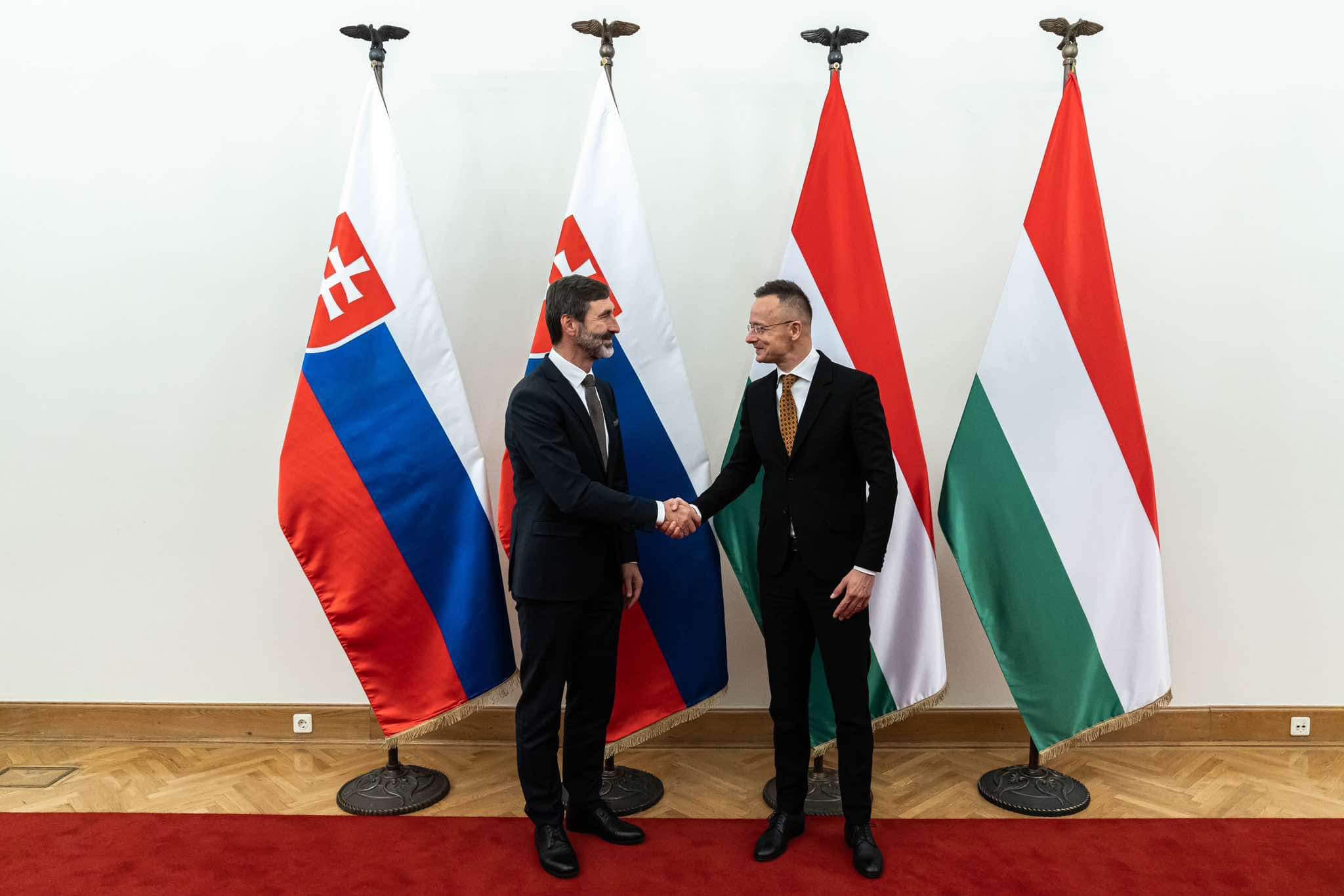
Hungary is ready to develop further the successful cooperation among the Visegrád Group — Hungary, Czechia, Poland and Slovakia — and strengthen trade and economic ties, Minister of Foreign Affairs and Trade Péter Szijjártó said at a conference in Budapest on Thursday.
Addressing the Visegrád 4 Business Conference, Szijjártó called V4 cooperation an “important element” of Hungary’s foreign policy strategy, his ministry said in a statement. He added that the V4 had improved the positions of its members on the European stage.
He warned against initiatives in the EU to decouple the economies of the East and the West and pointed to the V4’s earlier negative experience with blocs. Isolation can cause “serious damage” to Europe’s economy, he said, adding that Hungary was an advocate for connectivity and had adopted a policy of economic neutrality.
He said Hungary had become a “meeting point” for investments from the East and the West and was home to manufacturing bases of all three premium German car brands and five of the ten biggest Asian battery makers.
He said the V4 should concentrate on “pragmatic issues” and noted that Slovakia was now Hungary’s second-biggest trade partner, while Poland was the third-biggest and Czechia the sixth-biggest.
Read also:
Party of Orbán’s biggest challenger, Magyar, would revive the Visegrád Group

The Tisza Party is working to revive the Visegrád Group and supplement it with the rest of the countries of Central Europe, Péter Magyar, the leader of the opposition party, said at the congress of the New Slovenia – Christian Democrats party in Ljubljana on Saturday.
Tisza Party’s press service said Magyar was in agreement with German MEP Sven Simon and Matej Tonin, the leader of New Slovenia, that Slovenia, Hungary and Germany needed change as soon as possible and advocated a strong Europe built on sovereign member states that respect each other, as well as the protection of European Union borders and the strengthening of European competitiveness.
“Speaking as the leader of the Hungarian opposition, Péter Magyar said it was becoming apparent in more places in Europe that Hungary was not equivalent with Viktor Orbán,” the Tisza Party said in its statement.
Read also:
Speakers at CPAC Hungary want to fight against ‘woke ideology, illegal immigration, anti-Semitism’
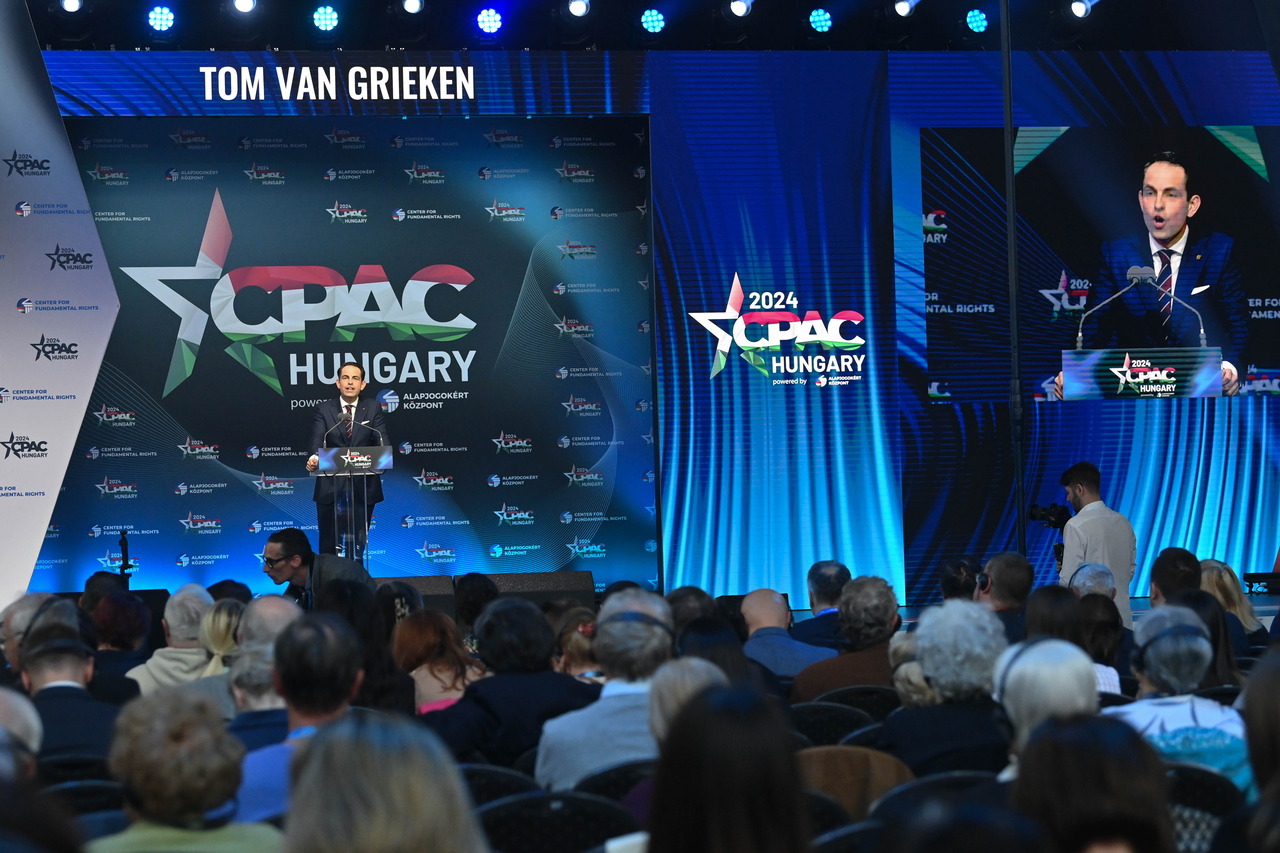
Several speakers argued for fighting against woke ideology, anti-Semitism and illegal immigration on the first day of CPAC Hungary, on Thursday.
Speakers at CPAC seem to agree

Tom van Grieken, the leader of the Flemish Interest party praised Hungary’s firm steps against illegal immigration, argued in favour of providing help to refugees in their country of origin and urged the deportation of illegal immigrants to their home country. He called Hungary the headquarters of conservative resistance.
Amichai Chikli, Israel’s Minister of Diaspora Affairs praised flourishing Israeli-Hungarian relations, saying that the Hungarian government was one of Israel’s main supporters. Wokeism, he said, was the enemy of family and was a threat to nation-states and diversity.
Marek Kuchinski, a representative of Poland’s Law and Justice (PiS) and the former speaker of the Polish Sejm, said the conference had brought together “free and equal countries that want to co-exist freely as equals”.
He said current challenges central Europe faced included a crisis of values, democracy and the rule of law, calling open dialogue and cooperation such as that of the Visegrád group (V4) countries “the most effective defence” against those.
Read also:
PM Orbán receives head of Slovakia’s Hungarian Alliance party
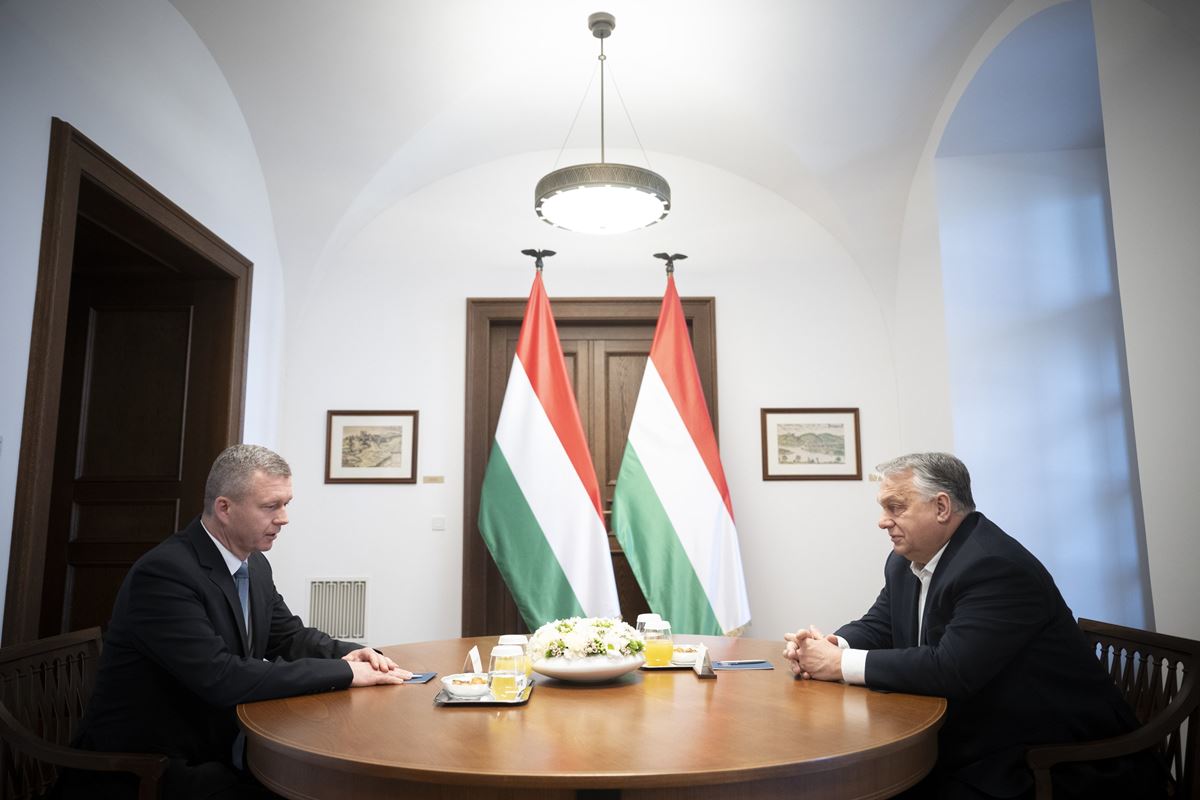
Prime Minister Viktor Orbán received Krisztián Forró, the leader of Slovakia’s Hungarian Alliance party, in his office on Monday.
Orbán and Forró discussed the Slovak presidential election on Sunday and said that cooperation was of paramount importance.
Forró, who is candidate in the race, said it was important for Slovakian Hungarians to show that “they are there and that Hungarian will still be spoken in Slovakia, even in a thousand years’ time.”
Orbán and Forró highlighted the importance of the Visegrad Group, arguing that Czechia, Hungary, Poland and Slovakia should “find common ground” as “they can achieve more together”.
They called for a ceasefire and peace talks in Ukraine, and took a stance against sending weapons or troops to Ukraine, “which is diametrically opposed to Hungarian interests.”
As we wrote last week, Slovak House Speaker Pellegrini holds talks in Budapest.
read also:
- Two in one: newest Hungarian-Slovak border bridge inaugurated for the second time – details HERE
Slovak House Speaker Pellegrini holds talks in Budapest – UPDATE
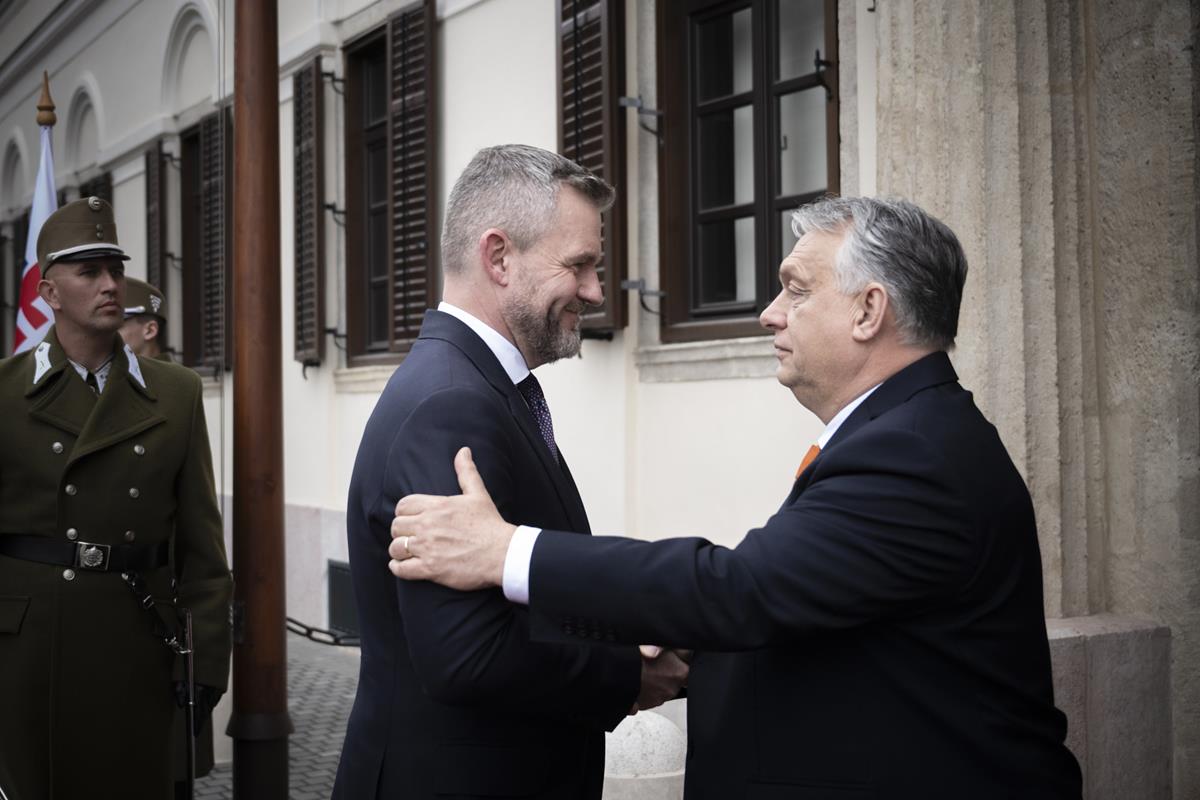
Prime Minister Viktor Orbán said on Monday in Budapest that Hungary will stick to its “policy of peace” and welcomes Slovakia’s similar stance after meeting Peter Pellegrini, the head of the Slovak National Assembly.
Orbán said Hungary was “watching with concern as hundreds of thousands die or become widows or orphans” in the war in Ukraine.
Orbán said peace was the most pressing issue currently, “but Europe is speaking the language of war.”
Hungary and Slovakia, meanwhile, are speaking the language of peace, he said. Orbán vowed Hungary would stand by its policy and said he hoped to be able to work for peace with Slovakia.
“Good neighbourly relations are all the more valuable in times of danger,” Orbán said.
Orbán and Pellegrini discussed matters pertaining to sovereignty, such as the European Union debate on “taking away member states’ right to veto certain issues, including foreign policy, and the ragulation that decisions must be voted for unanimously,” he said.
On that matter, Hungary and Slovakia are pro-sovereignty, he said.
Orbán thanked Slovakia for its help in protecting the Hungarian-Serbian border, noting that the country had sent policemen to perform their tasks there during Pellegrini’s premiership.
“We got help in protecting our southern borders, which is why we don’t have tens or hundreds of thousands of illegal migrants roaming central Europe today,”
He added that Slovakia and Hungary also fought together against the EU’s mandatory resettlement quotas.
He added that Hungary and Slovakia both value “energy freedom” and cooperate in energy policy, including nuclear energy.
He welcomed that 18 new border crossings have been opened between the two countries since 2018.
He praised Pellegrini as a prime minister under whose tenure Hungary and Slovakia’s friendship had deepened, “and we found common ground on which to build good neighbourly relations.”
read also:
Hungarian house speaker meets Slovak counterpart
Speaker of Parliament László Kövér met his Slovak counterpart, Peter Pellegrini, on Monday, to discuss the challenges brought on by illegal migration and the future of the European Union.
Kövér said in a press release that Slovakia and Hungary had similar views on the EU’s enlargement, migration and the future of the bloc, he said.
He slammed the EU’s treatment of south-eastern European candidates as “morally indefensible and unfair”, and called for the process to be sped up.
Hungary and Slovakia’s interests in “reforming the organisational and treaty system of the EU” are also similar, Kövér said. “We insist that the EU remains an alliance of strong member states.”
The two countries will also oppose all “encroaching attempts” to strip member states of competencies, Kövér said, citing mandatory resettlement quotas or scrapping unanimous decision-making as examples.
He called for further talks on cooperation “after the European parliamentary elections”. Slovakia is Hungary’s third largest trading partner, and the economic cooperation creates further fields of interest, he added.
Pellegrini praised the talks with Kövér as “open and informal”, adding that both countries were protecting their sections of the Schengen borders against illegal migration. He thanked Hungary for its part in protecting Slovak airspace, and noted that Slovak policemen were working on the border between Hungary and Serbia.
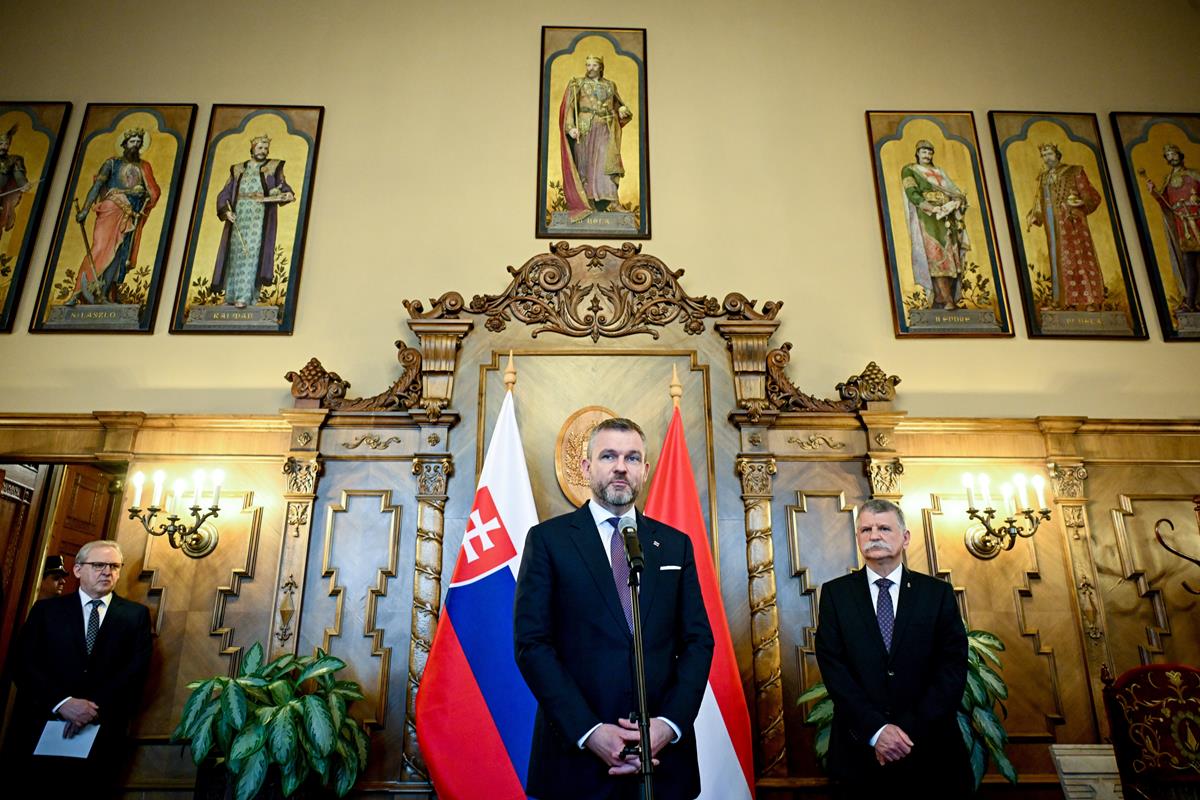
Hungary and Slovakia are also on common ground in their opposition to the EU’s mandatory resettlement quotas for migrants, he said.
They have similar stances on the war in Ukraine, he added. Slovakia will not send soldiers to Ukraine “under any circumstances”, he said.
He said Slovakia also has a vested interest in continuing cooperation with the Visegrad countries: Czechia, Hungary, Poland, and Slovakia. Together, the four countries account for 10 percent of the EU’s population and, therefore, have a significant weight in Brussels.
Pellegrini: Hungary and Slovakia in agreement on major issues
The governments of Slovakia and Hungary see eye to eye on important issues, Peter Pellegrini, head of the Slovak National Council, said after talks in Budapest on Monday.
Hungary and Slovakia are “not only connected through a joint position and a shared history, we are prepared to take further, active steps to develop our cooperation,” he said.
Pellegrini noted that he and Hungarian Foreign Minister Péter Szijjártó had inaugurated another new bridge serving as a further border crossing point between the two countries. As we wrote today, the newest Hungarian-Slovak border bridge was inaugurated for the second time. Details HERE.
He also said that the prime ministers of Slovakia and Hungary were preparing a new memorandum of understanding.
Concerning energy, Pellegrini said the two countries had linked their gas networks and built new electric links, too, in recent years. He also called for further, intensive cooperation in the area of nuclear energy. He welcomed that the two countries had managed to convince the Council of Europe to include nuclear energy in its list of safe energies.
He said Slovakia continued to assist Hungary in protecting its borders, adding that his government had sent “a sharp message to human smugglers” as one of its first measures:
“Slovakia will not be a transit country”.
“As a small country, Slovakia will never consent to remove the veto right of EU members,” Pellegrini said and welcomed that Hungary supported that position.
The Slovak government has decided not to send troops to Ukraine “despite being criticised for that sovereign and independent position bloodshed cannot be avoided unless we muster up the courage needed for peace talks,” he said.
Pellegrini said Hungary is a major business partner of Slovakia. He welcomed the increase in bilateral trade turnover and the support of both countries for their ethnic minorities.
Did Czech, Polish prime ministers shout at PM Orbán due to Sweden’s NATO accession?
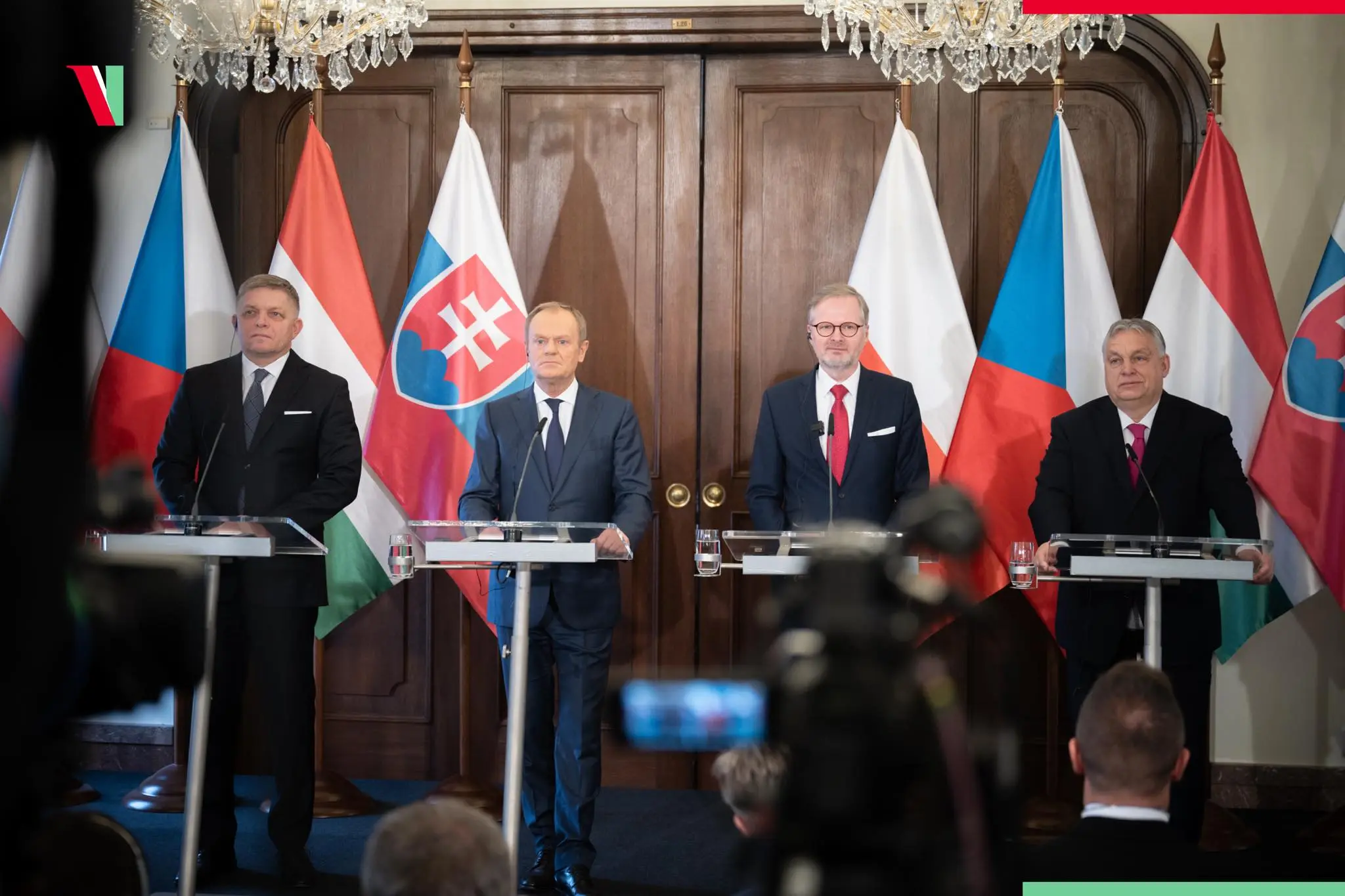
According to the newsletter of VSquare, the last V4 summit hosting all the leaders of the Visegrád Four countries (Poland, the Czech Republic, Slovakia, and Hungary) was a bit loud. Meanwhile, the prime minister’s press chief, Bertalan Havasi, denied media information.
The V4 summit was held behind closed doors in Prague, but the debate was fierce. Based on a source of VSquare, Czech PM Petr Fiala and Polish President Donald Tusk were shouting with PM Viktor Orbán requiring an explanation why he delayed Sweden’s EU accession and the European Union’s help for Ukraine, writes telex.hu.
Two government-close Czech sources said the debate was so heated that the press conference scheduled after the meeting had to be postponed. However, Slovakian PM Robert Fico remained silent for the whole time and did not defend PM Orbán.
Bertalan Havasi, the Hungarian prime minister’s press chief, said shouting at the Hungarian prime minister was fake news. Orbán said before that it was his 52nd V4 summit, but it was among the most difficult occasions. He added that such an intellectually and politically challenging debate is a rarity.
Before, protestors booed Fico and Orbán, saying they were the two pro-Russia leaders of the V4 cooperation.
Read also:
Orbán: there must always be an entity between Hungary and Russia 🔄
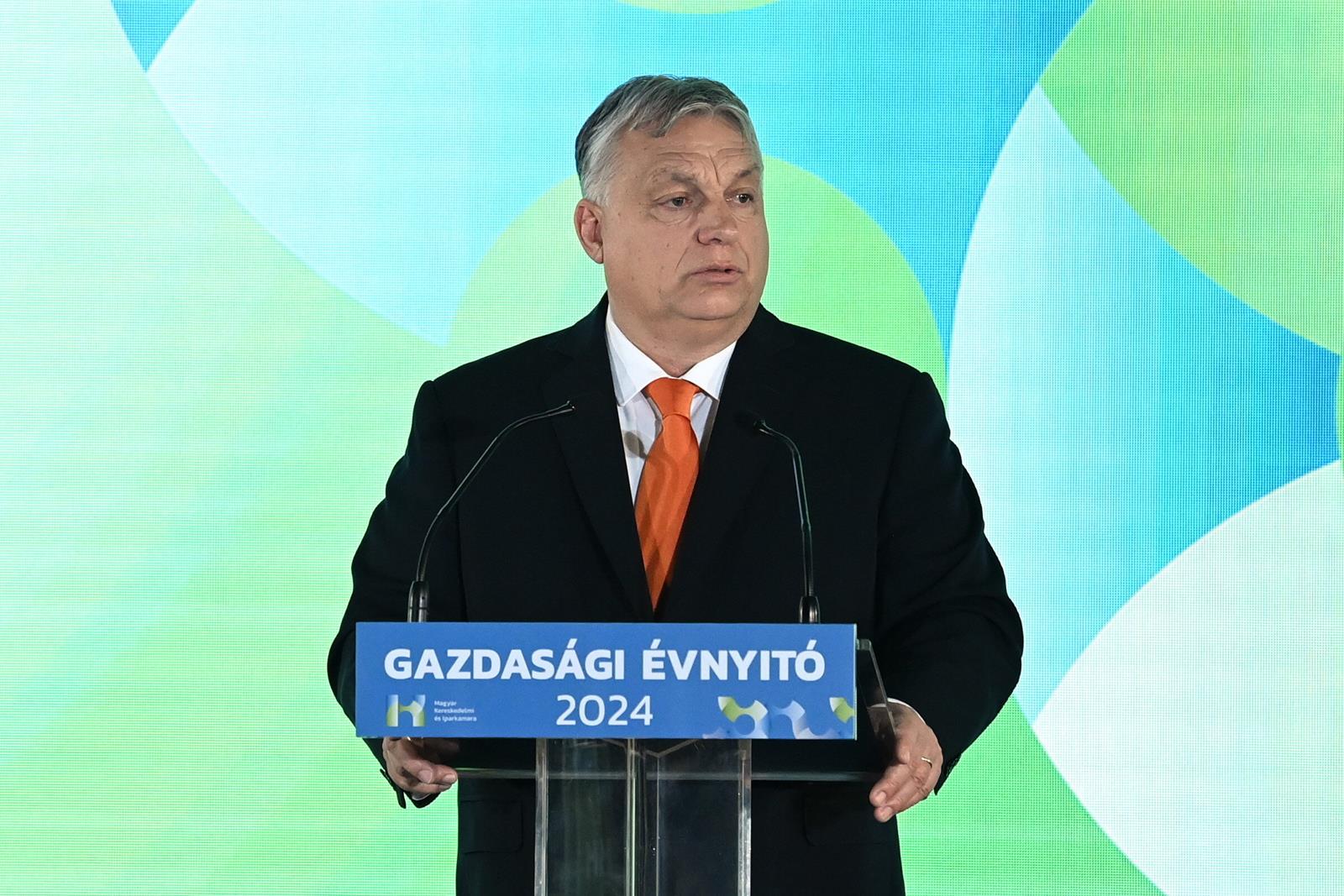
Prime Minister Viktor Orbán has expressed optimism about Hungary’s economic policy for the next two years, saying the conditions for a stable policy were in place.
Hungarian economy
Speaking at an event on Monday organised by the Hungarian Chamber of Commerce and Industry (MKIK), Orbán said a successful economic policy required competent finance and national economy ministries as well as the backing of a commerce chamber that could cooperate effectively with the government.
He said prime ministers were responsible for making sure that economic policy “remains backed up by simple, common-sense considerations”.
One such principle, he said, was that “it is always better if others owe us than if we owe others”, and it was better to “earn more than you spend … and profit off others than have others profiting off us”.
The prime minister said cooperation between the economy and finance ministries as well as with the chamber all contributed to a stable economic policy.
Orbán noted the government was grappling with “a very high inherited debt rate”, which he said had gone from 52-53 percent to above 80 percent after the 2002 elections. The government had reined it in, he added, but “it went up again after the pandemic”.
“What’s important is that in the end, we’re lenders rather than borrowers,” he said.
Concerning the budget deficit, Orbán said “we are spending more than we earn”, and, referring to employment, he said “if we do not work we will starve to death”. All efforts must be focused on “convincing people that it is worth working”. He said that employment figures reflected the government’s successful policies in this area.
Up to 2020 Hungary was on an upward path, but then the pandemic and the war in Ukraine forced the country to “shift to lower gear” between 2020-2024, Orbán said. Now there was a chance to accelerate in 2024, he said, adding that the real economy had not suffered big problems between 2020-2024 because the government had “allowed people and businesses to make money”.
West and East
The government’s philosophy of building ties across the global economy rather than “translating an economic policy mimicking the West into primitive formulas” had also helped, he said. While the West was “stumbling”, Hungary’s eastern relations “have continued to blossom.”
Hungarian businesses are the fourth largest investor group in their own country, the prime minister said, adding that this was impressive considering “the depths from where they started”.
Meanwhile, Orbán said the economic and political map of the world “is transforming at an accelerated rate”, adding “the western and eastern parts of the world have a completely different opinion on everything”.
Referring to the war in Ukraine, he said “the West, except for the Hungarians”, had got involved in the war, while the rest of the world remained noncommittal or supported Russia. Orbán said East and West had different view on Taiwan too. “With small differences, this applies to the Middle East.” Geopolitical rivalry overrode the logic of the markets, he said. “In fact, technological developments are also determined by political considerations.”
“The outcome of the debate may be crucial,” he said, adding that “one possibility … is decoupling; that is the West separating itself from the rest of the global economy and protecting its positions because competition with the East threatens the loss of areas under Western control and even its internal markets.”
The alternative, connectivity — that is coupling East and West — could mean that “the West loses ground, but the reason for that is a lack of competitiveness; in this case, it would not attempt to use political means to stop the East from advancing but become more economically competitive,” he said.
“Europe does not even believe in its own ability to embark on internal changes … to raise the competitiveness of Western businesses to Eastern levels,” Orbán said. Should a “cold war return with decoupling”, the border between East and West would lie along Hungary’s eastern border, he insisted, adding: “We will become an uninteresting, obscure and dusty periphery of the Western world.”
With cooperation and trade, he said, Hungary would be between two worlds as a country “in which both will find opportunities”, adding that Hungarian economic policy was based on the assumption that its position between those two worlds could be maintained.
Orbán said Hungary is a part of the West, but it would not detach itself from the world’s Eastern parts, noting that Hungary is a member of the Turkic Council, cooperates with China, and it would not give up its cooperation with Russia unless the European Union’s sanctions rendered this impossible in some areas.
“West won’t win it against the Russians”
Orbán said the first lesson to be learned from the war between Russia and Ukraine was the inevitability of European rearmament.
“We don’t know how long the Americans will stay here in Europe, and we can’t guarantee our security on our own, so defence industry developments are being accelerated everywhere,” the prime minister said.
He said Hungarians’ “instincts” had been right, arguing that the country had embarked on an unprecedented military upgrade 3-4 years before the war broke out.
“So we’re ahead of everyone by 2-3 years,” Orbán said. “Politics can sometimes be a world of intuitions, not just matters of fact. This is true for both the green transition and defence industry developments.”
He said the war in Ukraine was a “proxy war”, and it was “completely obvious that the West won’t win it against the Russians”. He added, at the same time, that this was also true the other way round, and “sooner or later there will be peace talks”.
“The question is who has time on their side,” Orbán said. “We’re the only country that says that time is on the Russians’ side, so our interest lies in this conflict ending as soon as possible.”
Orbán noted, however, that “most countries in western Europe, unfortunately, believe that time is on the West’s side”. “This is an interesting train of thought if one is sitting on the shore of the Atlantic Ocean and not the Carpathian Basin.”
He said the main principle of Hungary’s security strategy was that there must always be an entity between Hungary and Russia, “and right now this is called Ukraine”.
The main question of the war from Hungary’s perspective, Orbán said, was whether Russia’s border would move closer towards Hungary, adding that if the fighting continued, the Russian border would be closer, owing to the Russian military successes.
“This is completely against our interests, but at the same time we are convinced that there’s only one way to avoid this: if the West pulls itself together and tries to achieve peace talks,” he said.
Orbán said this “won’t be as easy now as it would’ve been a year ago”, arguing that Russia now clearly had the military advantage.
Trump’s return
Meanwhile, he said, another threat to Europe was that Russia would only be willing to negotiate with the United States, and Europe’s security situation would become dependent entirely on an agreement between Russia and the US.
“So, the direct security situation isn’t looking good … and the only sane chance on Hungary’s part is to bet on President Trump’s return,” Orbán said.
Only a new player who did not have a role in the outbreak of the war could find a way out of it, the prime minister insisted, adding that the world’s only chance for “a relatively quick peace deal” was for there to be political change in the US.
“So, the question of who Hungary likes or doesn’t like isn’t one of sympathy, but about which president pursues a foreign policy that strengthens Hungarian security,” he said.
“We can’t have a say in what kind of a president America should choose, but we don’t see that the current American administration has the ability to secure a swift peace on this front,” Orbán said, adding that this was also a critical factor for the Hungarian economy.
European parliamentary elections
The prime minister said the European parliamentary elections would be significant in terms of “common sense”.
He said the European political scene was divided between “the globalists and federalists on one side and the sovereigntists on the other”. He said politics in Europe today was driven by ideology, adding that the biggest problem was that those in the key positions “tend to think along the lines of left-wing ideology, and those are the kinds of decisions they make”.
But, he said, “ideological thinking” could not keep an equilibrium between ideas and practice. He said the “triumph of ideological thinking over reality” resulted in the enactment of measures in areas like climate policy or agriculture “that seem right in principle but ruin us in the process”.
Orbán said the solution was therefore to elect a right-wing European leadership that “respects reality more”.
“There will certainly be a rightward shift towards common sense in Europe, but it’s not yet known whether this will be a breakthrough or just a change in the balance of power,” Orbán said, adding that realistically it would be the latter.
Visegrad Group
Turning to Hungary’s regional partnerships, Orbán noted that Hungary, Czechia, Poland and Slovakia had for long “thought in terms of the Visegrad Group structure”, and though this should not be abandoned, “as long as it has life left in it”, there was also an opportunity for another cooperation among “sovereigntist countries”.
This partnership, he said, included Hungary, Slovakia, Serbia, noting that there was an election scheduled for September in Austria, too. This, he said, could “easily lead to” an Austrian-Hungarian-Slovak-Serbian partnership in the coming period, which would not replace, but rather complement the V4.
Foreign investments
Meanwhile, Orbán said foreign businesses were pulling 4-6 billion euros in earnings out of Hungary, but a ban on profit repatriation would hamstring investments.
But this “openness”, he said, was not a problem if the foreign investments of Hungarian businesses generated more profits than what was repatriated by foreign companies.
Foreign investments generate an average of 1.3-1.5 billion euros in profits, and factoring in 1.0-1.5 billion euros in EU transfers, this leaves some 3 billion euros of profits in Hungary as against the 4-6 billion that is repatriated, he said.
In terms of the future, Orbán said it was important to support national holdings capable of generating profit abroad and repatriating it, mentioning oil and gas company MOL, OTP Bank, real estate, infocommunications and the defence industry as examples.
If these investments abroad can be financed and supported, and if there are entrepreneurs with competitive goods and services, they have to invest, otherwise “the balance of profits will never be restored, and we’ll always be left … feeling like we’re being exploited”, he said.
Concerning the 6.5 percent budget deficit, Orbán said there were many factors that had to be combined when it came to planning the deficit, arguing that the government did not want growth to be halted, to cut spending, risk the standard of living, or scrap family support measures or utility price caps.
Citing the finance minister, Orbán noted that the government aimed to cut the budget deficit to 4.5 percent of GDP this year, before reducing it to 3.7 percent next year and to 2.9 percent in 2026.
He said the EU economy was only just returning to a “regulated functioning” after the pandemic, noting that EU finance ministers predict that it will take four years for all member states to stabilise their budget deficits below 3 percent and their public debt levels below 60 percent.
If, for some reason, Hungary failed to cut its deficit and debt in three years, it still had another “buffer year” to do so without risking being penalised by the EU, the prime minister said.
He said it was possible to meet this target, noting that a member state that took on structural reforms had seven years to meet the budget deficit and public debt criteria again. “But we don’t trust those in Brussels enough to base our fiscal strategy on this, so let’s stick to this 3+1 year solution,” he added.
Orbán also said it was important to answer the question of “what happens if our bets don’t win”, meaning that the government’s desired political changes don’t happen in either the US or Brussels, and it takes longer to reduce the deficit.
PM Orbán does not believe in Ukrainian victory – UPDATED
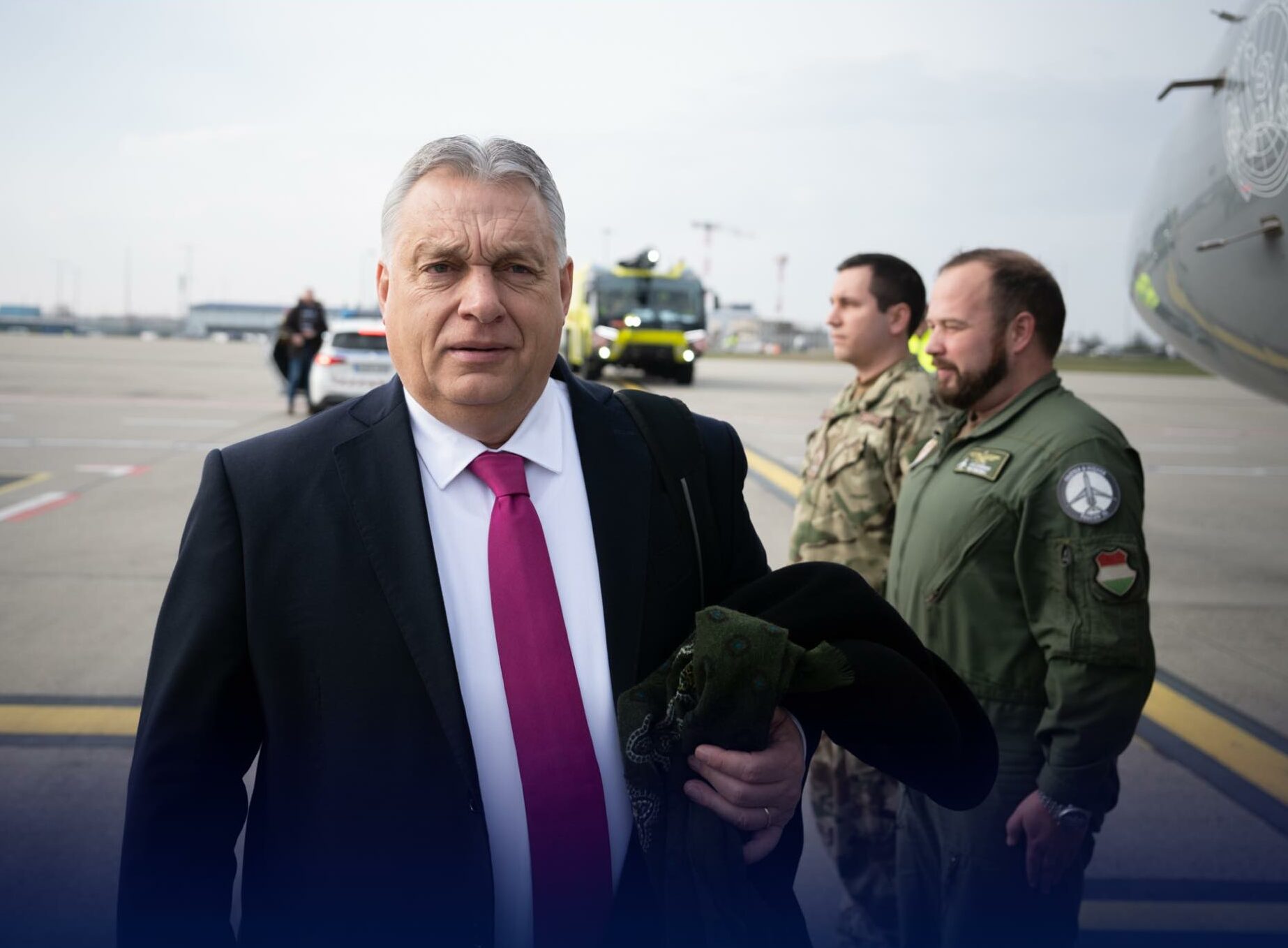
The Visegrád cooperation has “meaning and future” despite differences in opinion on support for Ukraine, Prime Minister Viktor Orbán said after attending a summit of the Visegrád Group in Prague on Tuesday. Foreign Minister Péter Szijjártó welcomed it as good news for Hungary that the leaders of the four Visegrád Group countries agreed on continuing the bloc’s cooperation at their meeting in Prague on Tuesday which he said was also in Hungary’s national interest.
“Today’s meeting convinced me that Visegrád is alive and important. We are able to respectfully acknowledge our differences even if we debate each other’s stances. We continue to strengthen cooperation in joint issues. Hungary is ready to do that,” Orbán told a press conference.
The Czech, Polish and Slovak prime ministers also acknowledged differences and took a stance for continued cooperation.
Orbán said the summit “was not one of the easiest ones” as it had focused on “self-reflection” and on whether the Visegrád Group should be maintained in its current form.
He noted that a similar meeting had taken place after the EU integration of the Visegrád countries, ending in the decision to maintain cooperation.
The war in Ukraine “has overwritten everything”, and so the issue was back on the table, Orbán said.
Avoid joint border with Russia
The prime ministers of Czechia, Hungary, Poland and Slovakia were in agreement that Russia’s attack on Ukraine had been a “gross violation of international law”, and that Ukraine needed aid, Orbán said. “Hungary has another issue, namely that it wants to avoid having a joint border with Russia again, as it had bad experiences in the past,” he added.
“One of the most important baselines of Hungarian national security is to have an entity between us and Russia. We help Ukraine also out of our own national interest,” he said.
At the same time, Orbán said the Visegrád countries disagreed on “how to help Ukraine well”.
“Hungary’s stance is clear: we shall not send weapons to Ukraine, with or without troops, but are ready to provide any other aid,” he said, noting the country’s efforts on humanitarian aid and care to Ukrainian refugees.
Despite those differences, Orbán said carrying on with the Visegrád cooperation “makes sense”.
Cooperation has been successful on issues such as illegal migration “as the matter of [mandatory resettlement] quotas is not off the table”. “Without our cooperation, tens or hundreds of thousands of migrants would be roaming our countries.”
It is impossible to tell who will win
Asked who he thought would win the war, Orbán called the question a “trap” and said “it is impossible to tell who will win.”
He rejected “branding” one or the other of the parties “culpable or guilty… that doesn’t lead anywhere”. “I suggest everyone maintains a strategic calm on the issue.”
“All countries have the right to view the Russia-Ukraine war from Russia or Ukraine’s viewpoint.” Hungary, Orbán said, was unique in that respect as it viewed the matter from a Hungarian viewpoint. Hungarians maintain that neither Russia nor Ukraine backed by the West would be able to defeat the other, he said. In that situation, it is imperative to save lives and start peace talks as soon as possible, he said.
He rejected the notion that Hungary had been isolated in international politics because of its views on the war.
Responding a question, all four prime ministers said their countries were not considering to send troops to Ukraine.
Robert Fico of Slovakia said his country “will give all aid needed to Ukraine, except for weapons and ammunition.”
Petr Fiala of Czechia and Donald Tusk of Poland said they would be ready to continue to provide weapons and ammunition.
UPDATE 1: Differences are not as large as they seemed before
The Visegrád countries agree that Russia is the aggressor in the war in Ukraine, and that the latter must be aided, the prime ministers of Czechia, Hungary, Poland and Slovakia told a joint press conference on Tuesday after a summit in Prague. Petr Fiala of Czechia and Donald Tusk of Poland reiterated that their countries would continue supporting Ukraine “in all areas including weapon and ammunition deliveries”. Fiala said Czechia had committed to organising ammunition procurement from third countries “since European countries have run out of free reserves”. The scheme is supported by some 15 countries, Fiala said.
Tusk called Russian President Vladimir Putin a “war criminal”. Viktor Orbán of Hungary and Robert Fico of Slovakia called for peace talks as soon as possible. “The differences between the Visegrád countries are not as large as they seemed earlier,” Tusk said.
UPDATE 2: FM Szijjártó welcomes V4 agreement on continuing cooperation
Foreign Minister Péter Szijjártó welcomed it as good news for Hungary that the leaders of the four Visegrád Group countries agreed on continuing the bloc’s cooperation at their meeting in Prague on Tuesday which he said was also in Hungary’s national interest. Szijjártó noted the V4’s “outstanding achievements” in ensuring that central Europe remained “strong, sovereign and competitive”.
“Many were probably expecting the disintegration of the bloc”, he said, adding that the V4 prime ministers had stood up for continued cooperation.
“This is also in our national interest so that we can cooperate in future on matters that will strengthen Hungary, its sovereignty and economic competitiveness,” the foreign minister said, according to a ministry statement.
“The four of us will be able to cooperate in preserving our sovereignty and in designing our own energy mix, as well as in preserving our competitiveness by setting our own tax rates,” said Szijjártó.
He also welcomed that the V4 countries would be able to decide on their own how to protect their farmers against the glut of poor quality grain from outside Europe.
Read also:
Hungary wants to resurrect the Visegrád Four cooperation
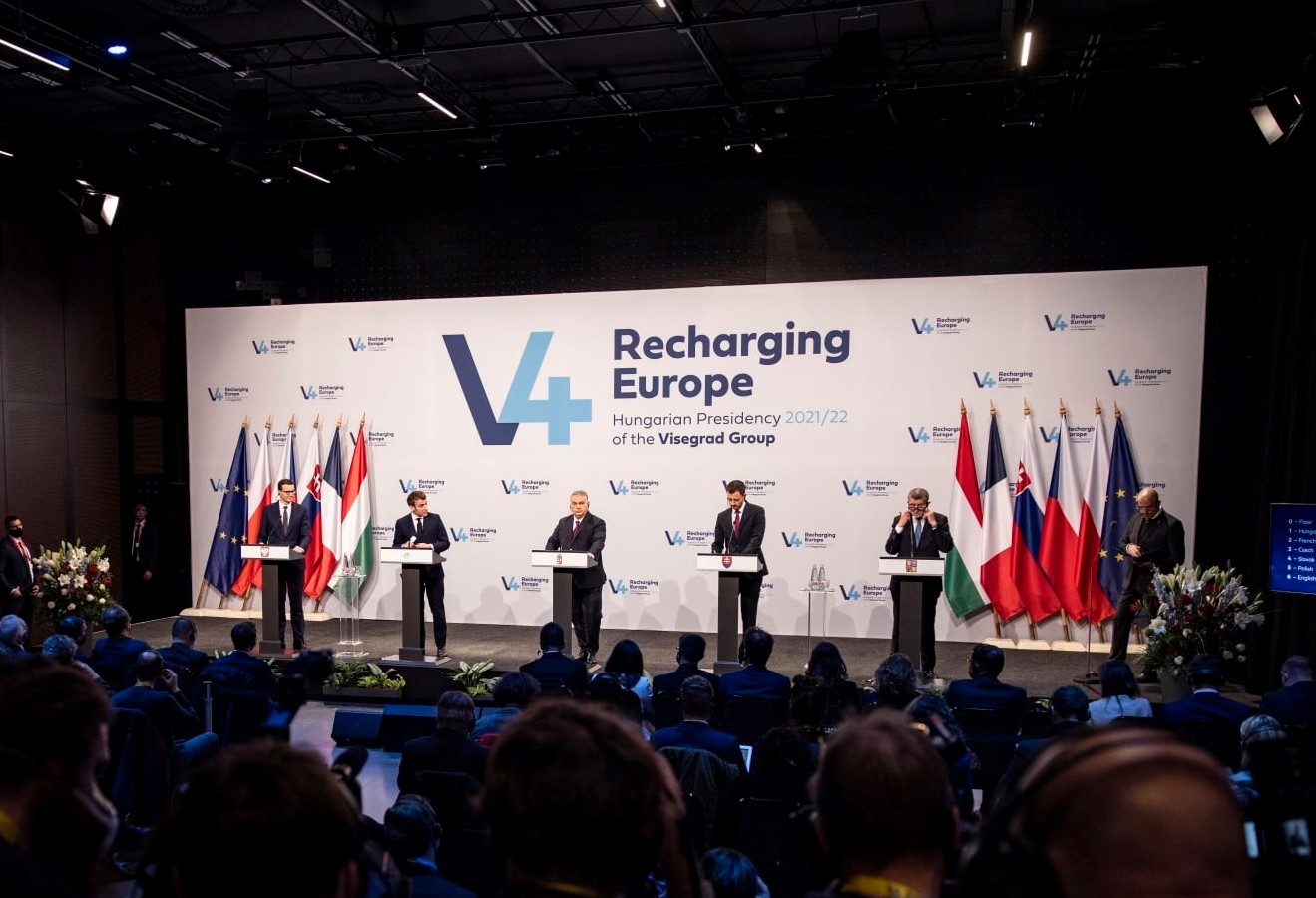
Commenting ahead of a Visegrád Group summit in Prague on Monday, Péter Szijjártó, the foreign minister, said on Facebook that “there will be a great need for close central European cooperation in preventing a series of dangerous decisions from being made in Brussels”.
Szijjártó said Hungary, Slovakia, Czechia and Poland needed each other to prevent the mandatory distribution of illegal migrants, to stop low quality grain imports from Ukraine, to argue against taxes from being harmonised across Europe and against “the ideologically based discrimination” of nuclear energy.
“Of course, our positions on the EU’s response to the war in Ukraine and on peace are different; still, we are ready to continue cooperating in areas where our national interests coincide,” Szijjártó said.
The V4 cooperation halted after Russia’s invasion in Ukraine. Poland has a pro-Ukraine stance, while Hungary would like to remain a bridge between the East and the West. Last time, for example, the Orbán cabinet vetoed an anti-Putin EU resolution.
Read also:
- Agricultural chambers of V4, Latvia and Lithuania to hold joint demonstration on this week – Read more HERE
V4 heads of govt to meet in Prague
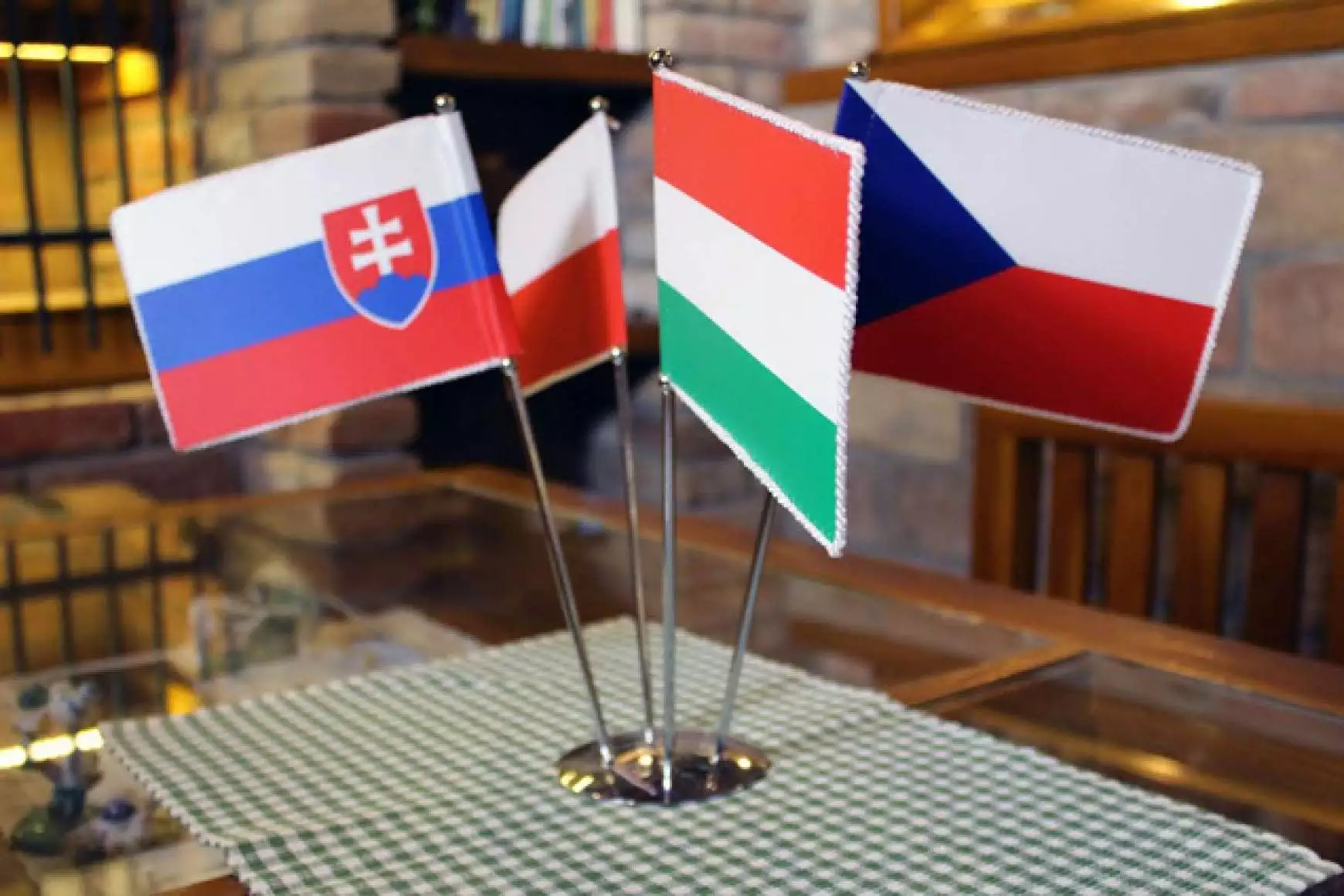
The heads of government of the Visegrad Group are scheduled to meet in Prague on Feb 27, the Czech government office said on Monday.
The prime ministers of Czechia, Hungary, Poland and Slovakia are scheduled to discuss energy security, the European Union’s strategic goals and illegal migration, the statement said.
Ahead of the meeting, Czech PM Petr Fiala will have bilateral talks with his Polish counterpart, Donald Tusk, on the subject of the war in Ukraine, regional defence cooperation, energy and migration, it said.
Read also:
Agricultural chambers of V4, Latvia and Lithuania to hold joint demonstration on this week
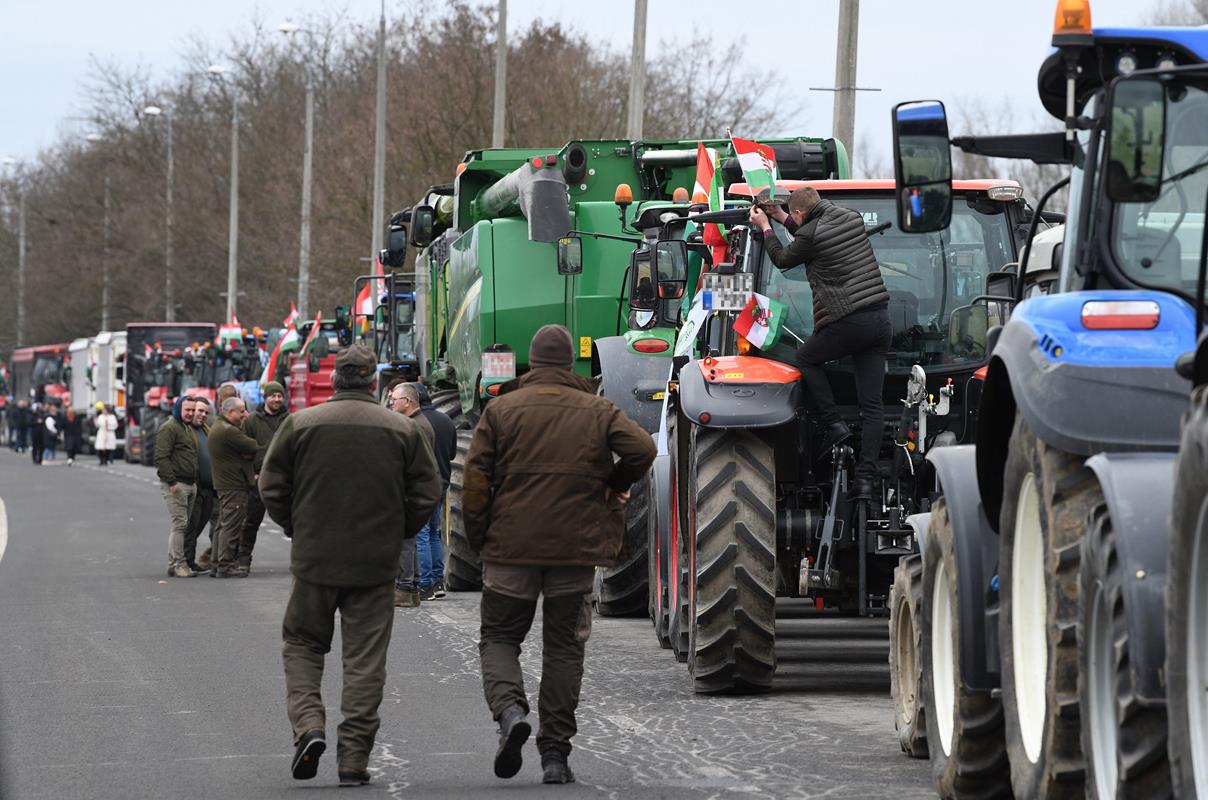
The agricultural chambers of the four Visegrad Group countries will organise a demonstration together with their Latvian and Lithuanian peers on Feb 22 to call the public’s attention to their situation caused in large part by the unrestricted inflow of Ukrainian grain and food products, the head of the National Agricultural Chamber (NAK) said on Monday.
The EU’s Common Agricultural Policy (CAP) has gone nowhere over the past years and European farmers have been labelled “climate criminals”, with the term officially codified in community law, Balázs Győrffy told public news channel M1. He called the European Green Deal, a set of policy initiatives proposed by the European Commission, “an unprofessional and unfounded diktat”, adding that “in light of the recent farmer demonstrations, decision-makers are now backpedaling” which Győrffy said he believed “could be because of the upcoming EP elections”.
“The unlimited inflow of grain and food products, mainly poultry, egg and honey, from Ukraine makes the situation worse by creating uneven competition for European farmers and consumers also because they are not subject to strict EU regulations,” said Győrffy.
Speaking to public broadcaster Kossuth Radio, Győrffy said “farmers across Europe are in an uproar and have lost their patience”.
“What we can see is that the elite in Brussels absolutely ignores our opinion and does not listen to our problems”.
As we wrote earlier, Hungarian farmers protested against unlimited Ukrainian agricultural imports – details and PHOTOS
Also we wrote before, that GMO-contaminated Ukrainian seed was seized in Hungary, details HERE.
Visegrád 4 countries protest against EU policies
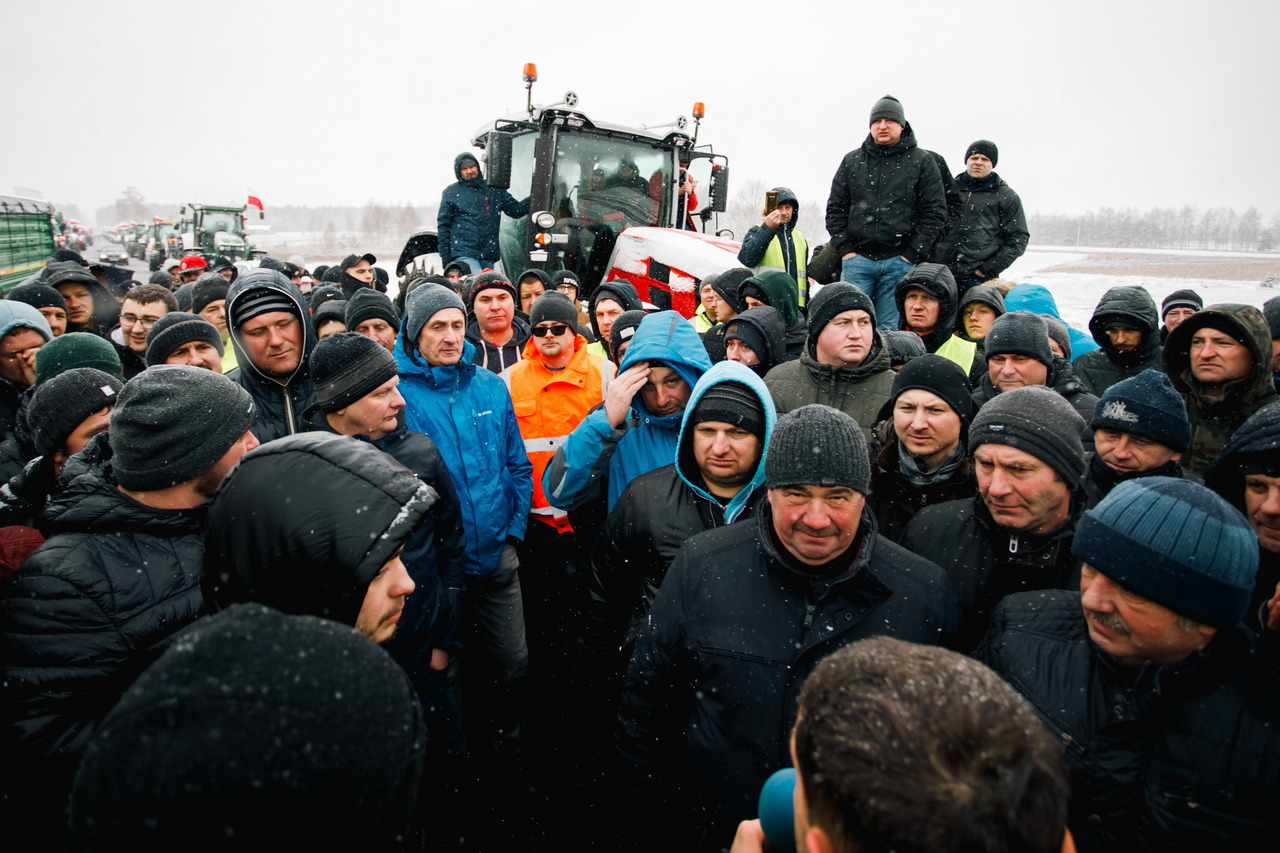
Agriculture chambers from the Visegrád Group – Hungary, Czechia, Poland and Slovakia – along with ones from Lithuania and Latvia protested against the European Union’s agricultural policies at a meeting on the outskirts of Warsaw, the Hungarian Chamber of Agriculture (NAK) said on Tuesday.
The chambers called on decision-makers in Brussels to stop “making things impossible” for European farmers, NAK said.
The V4 chambers decided to organise a protest on 22 February against the dumping of Ukrainian agricultural import products at the shared border between Slovakia, Poland and Czechia.
European Commissioner for Agriculture Janusz Wojciechowski was present at the two-day meeting in Otrebusy.
Read also:
Government: war in Ukraine has no military solution
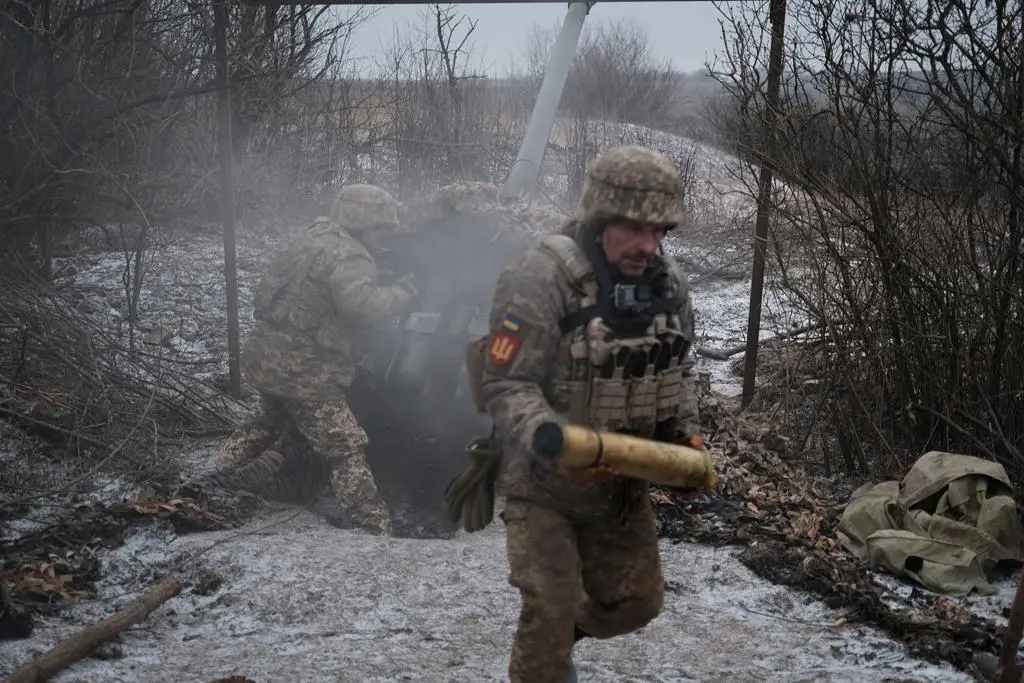
Hungary is committed to the cooperation of the Visegrád Group and supports the EU integration of the Western Balkan countries, the defence minister said on Friday, after a meeting of the four countries’ defence ministers in Prague.
At a joint press conference with Jana Cernochova, his Czech counterpart, Kristóf Szalay-Bobrovniczky said their meeting went to show that despite a difference of opinion at times “we are in agreement on the important matters”.
At the meeting, Hungary took over the presidency of the Central European Defence Cooperation (CEDC) from Czechia.
In connection with the Hungarian presidency starting in January, Szalay-Bobrovniczky said it would be built on the Czech presidency’s results and would continue the initiatives that presidency launched.
“Central Europe’s security is linked to the stability of the Western Balkans, the Hungarian CEDC will therefore put great emphasis on broadening high-level dialogue and practical cooperation between the two country groups as well as on promoting the EU integration of the Western Balkan countries,” said Szalay-Bobrovniczky.
Concerning the Russia-Ukraine conflict, the defence minister reiterated that Hungary supported a ceasefire, talks and peace. He said that the conflict had “no military solution” and suggested that the EU should revisit its Ukraine strategy.
Read also:
Visegrad Group interior ministers meet with the counterparts of Germany and Austria
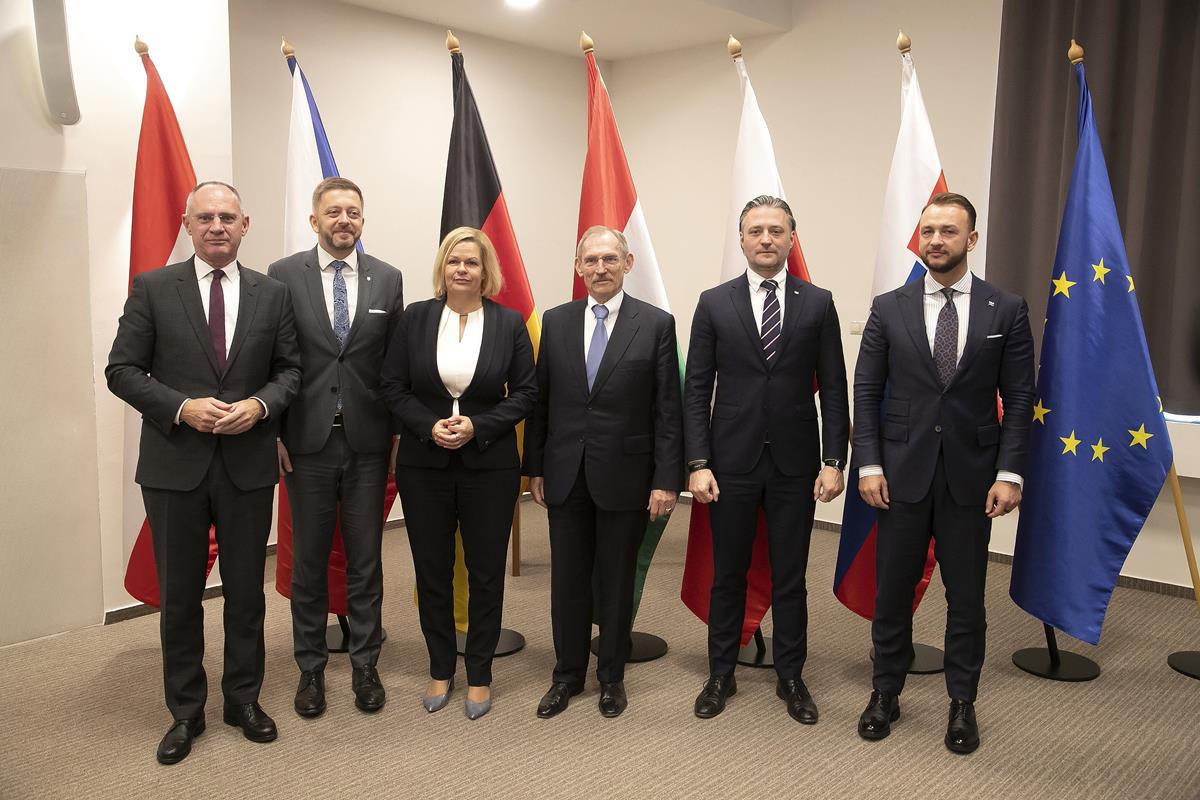
By defending its own borders Hungary is also protecting the public security of other EU countries, Sándor Pintér, the interior minister, said on Monday in Szeged, in southern Hungary, where Visegrad Group counterparts met with the interior ministers of Germany and Austria.
At the meeting, he briefed his counterparts on how Hungary is going about protecting the external Schengen borders as well as forms of international cooperation the country is now engaged in and future related plans, he told a joint press conference.
Whereas Hungary “is ready to cooperate and accept proposals”, it will not agree to the mandatory relocation of migrants, he said, adding that this was a matter of sovereignty.
Czechia’s Vit Rakusan said joint action was required to handle migration and protecting the external borders was a common interest.
Given pressure from the Western Balkan migration corridor, law enforcement cooperation with third countries would continue, he said, noting that Czech police have been involved in border protection since 2015, and Czechia plans to continue this assistance in 2024.
The ministers agreed to hold regular meetings to evaluate migration processes, he said, adding that controlling internal borders was far less preferable than protecting the external borders. A common European solution was needed, he said, but finding a compromise “is not straightforward”.
Germany’s Nancy Faeser the pressures of secondary migration had led many member states to introduce internal border controls, even though all EU countries preferred open borders within the EU.
She said joint action against people smuggling was required and Frontex must be strengthened.
Protecting human rights was “the basis of European cooperation”, she said, adding that this was especially so in the case of migration policy and the defence of the external borders.
Austria’s Gerhard Karner said his visit to Hungary had highlighted the importance of protecting the external borders, noting that Austrian, Czech and Slovak police officers were assisting these efforts effectively.
Slovakia’s Matus Sutaj-Estok said his country stood ready to provide help in protecting the bloc’s external borders, and the state of affairs was “favourable right now” thanks to “the action of the Serbian authorities and the weather” but preparations were needed to handle what would inevitably be renewed migration pressure in the spring.
Poland’s Bartosz Grodecki, the deputy interior minister, said the Schengen zone was a core value of the EU that must be maintained.
As we wrote a week ago, Hungary resumes residency sales for the wealthy, details HERE.
- read also: Why do German pensioners flood Hungary? – VIDEO
Hungarian president speaks about seemingly dead cooperation
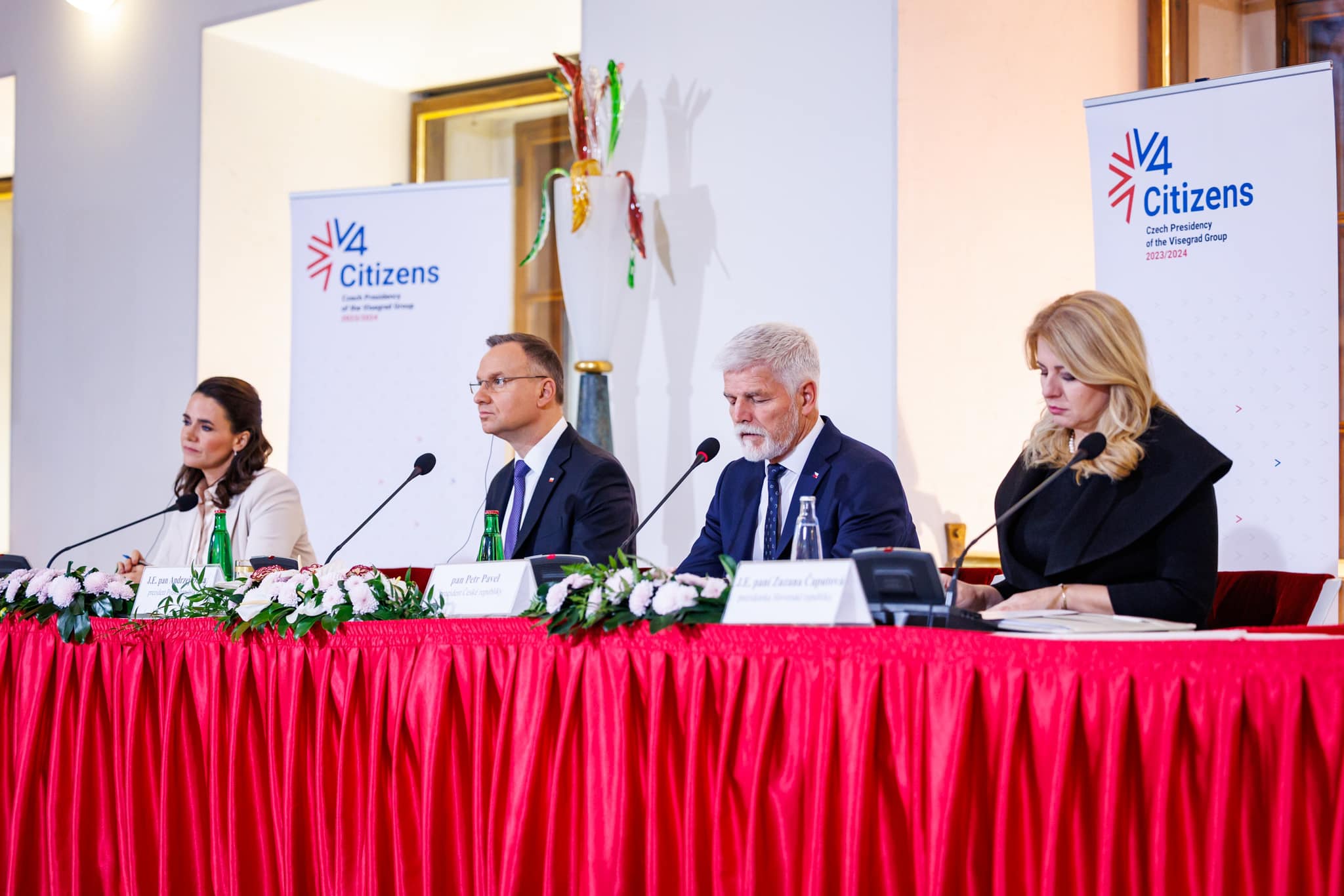
The Visegrád cooperation “is alive and well” and has a long future ahead, the Hungarian president said at a press conference after attending a summit of the V4 countries’ heads of state in Prague on Wednesday.
The cooperation among the Visegrád countries has a history of 700 years, and Czechia, Poland, Hungary and Slovakia aim to keep that cooperation and “add new content to it”, Katalin Novák said.
The issue in focus of the meeting was security, said Novák, adding that the Visegrád Group “form a safe island in the heart of Europe” in that respect and they view this “as a treasure” which they want to safeguard in the long term.
Novák said the Visegrád countries’ presidents deemed highly important the protection of EU and its external Schengen borders, effective measures against mass illegal migration and protection against terrorist acts.
Russia, Israel, Ukraine, energy
Concerning the war in Ukraine, Novák said that the common position of the V4 was that Russia must not win the war. “We stand behind Ukraine and we are trying to provide maximum assistance for it to have the opportunity to protect its country and its people in the war,” she said. Novák said the situation of minorities in Ukraine could not be “subject to negotiation”, and asked her counterparts to pay increased attention to the issue.
Commenting on the “brutal terrorist attack” against Israel, Novák said the four presidents were in agreement on the need to pre-empt an escalation of the conflict and minimise the civilian death toll. She repeated the call to Hamas to release the hostages and welcomed the agreement on a ceasefire and the freeing of hostages. Novák underscored Hungary’s univocal support for ensuring the security of the members of its Jewish community, vowing that the country would continue to guarantee that in the future.
The Hungarian president said they had also discussed ways to speed up transport among the four countries, cut dependence on Russian energy supplies and switch to the use of green-energy. The V4 presidents were in agreement that nuclear energy should be maintained as “a clean energy resource” in future.
Speaking about Europe’s competitiveness, Novák said that without turning around “the negative demographic trends” the chance to maintain and bolster competitiveness was slim.
Poland & Hungary “serious allies”?
The president said she had proposed doubling the Visegrád Fund’s annual budget of 10 million euros which would allow providing increased support to programmes aimed at strengthening cooperation among the Visegrád countries and potentially supporting countries outside the group.
Novák noted Hungary’s upcoming EU presidency in the second half of 2024 and Poland’s V4 presidency starting also in next July, expressing hope for the two countries to be “serious allies” during that period.
Asked about funding withheld by Brussels, Novák said it would give cause for concern if unfreezing the funding was “merely a matter of politics” and depended solely on whether “the government of the country in question was liked or not by Brussels”. She insisted that although Hungary had met all the criteria set by the European Commission for releasing the funds, it had not received funds it is entitled to.
Read also:
- Hungarian consumption falls short of even that of Romania – Read more HERE
“This undermines the trust of citizens in the European Union, not only in Hungary, but also in many other EU member states.”
Hungary govt official addresses World Bank/IMF annual meeting

The latest forecast of the International Monetary Fund (IMF) is in line with the Hungarian economic policy’s expectations for next year, the state secretary for macroeconomic and international affairs said at the annual meeting of the IMF and the World Bank in Marrakesh on Thursday.
Speaking to MTI by phone, Tibor Tóth said governments, central banks and financial sector players are looking for solutions to the issues of climate change, debt reduction and the digital transition at this year’s annual meeting.
The IMF projects 3.1 percent GDP growth for Hungary in its 2024 forecast, the highest among the V4 countries and more than double the 1.5 percent growth rate predicted for the European Union as a whole, Tóth said.
As regards inflation, the IMF expects the consumer price index to fall into the single digits this year, projecting CPI of just over 8 percent at year-end and 6.6 percent annual average inflation in 2024. This is in accordance with the finance ministry’s forecast of 6 percent for next year, Tóth said.
He pointed out that negotiations with the IMF have changed significantly. While during the 2008 crisis, the then government asked for financial assistance, the current period is characterised by partnership and exchange of experience. The IMF’s crisis management policy has changed a lot partly because of Hungary’s successes; earlier it had considered austerity as the only way out of crises, whereas now it pursues a supportive economic policy, Tóth said.
Government acknowledged that there are too many conflicts between V4 countries

Tibor Navracsics, Hungary’s minister for regional development, urged deeper cooperation among the Visegrád Group countries, at an international conference in Budapest on Friday.
In order for the central European grouping comprising Czechia, Hungary, Poland and Slovakia to be successful, the four countries must deepen their cooperation, Navracsics told a panel discussion at the Visegrad Summer Academy conference organised by the National University of Public Service and the Waclaw Felczak Institute of Polish-Hungarian Cooperation.
The minister said that of the four members, Hungary had the strongest emotional commitment to the grouping. He said Czechia and Slovakia were members of the V4 for “pragmatic and geopolitical” reasons, while Poland was a member “on a pragmatic and emotional basis”. Navracsics emphasised that cooperation among the four countries was especially good when it came to handling the issue of migration, but the war in Ukraine and Russia’s aggression had brought “a number of disagreements and debates to the surface”. He noted that the Hungarian government urged an immediate ceasefire and a just peace in Ukraine. He said the V4 needed “symbolic gestures” and its political cooperation to be strengthened.
Read also:
- Stunning sight: Ghost hotel in Visegrád, Hungary – PHOTO GALLERY – Read more HERE
- Hungarian consumption falls short of even that of Romania
The event was addressed in a video message by President Katalin Novák, who underlined that the conference’s young participants were the guarantee of the V4‘s future. She highlighted the significance of the Waclaw Felczak Institute’s activities when it came to the strengthening of Hungarian-Polish friendship and stressed the importance of regional cooperation among central and eastern European countries during the war in Ukraine. Marek Kuchcinski, head of the Polish Chancellery, said the war had caused Warsaw to increase its defence spending to 4 percent of GDP. He said the V4 needed to ward off the “divide and conquer principle being applied by Moscow and Brussels”. All wars strengthen regional cooperation, and this is needed between Warsaw and Budapest, he added.
Speaker: Hungarian nation’s existence in continuous threat
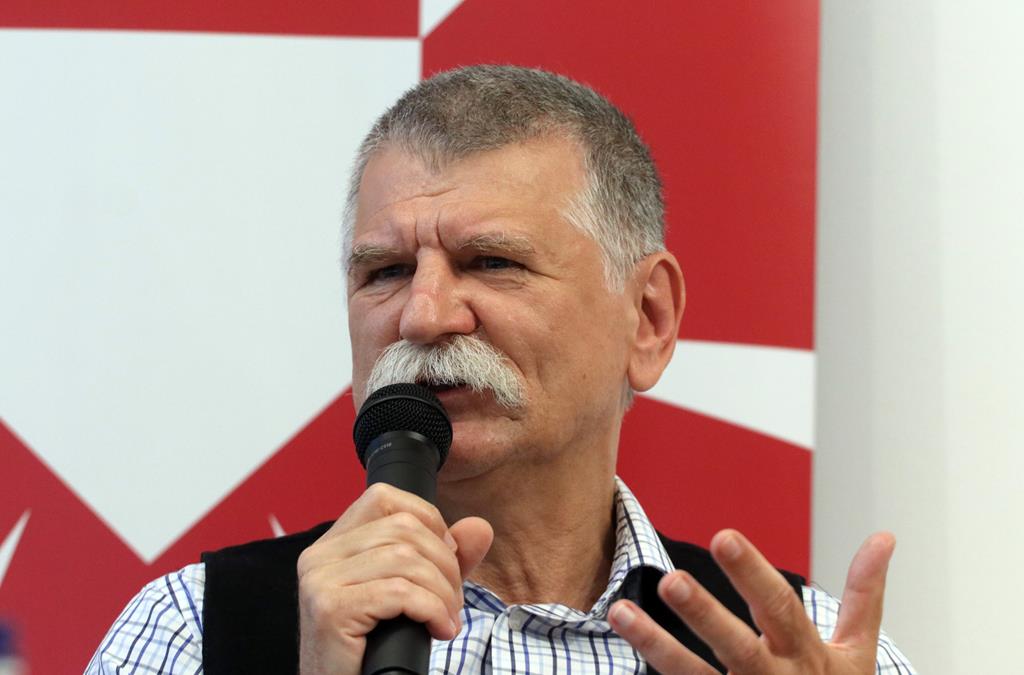
The key to the longevity of the Visegrád Group has been its members’ ability to focus on issues that are of a shared interest and on which there is a chance for agreement, Speaker of Parliament László Kövér said at the All-Hungarian University Students’ Camp in Satoraljaujhely, in north-eastern Hungary, on Monday.
The cooperation between Czechia, Hungary, Poland and Slovakia has been most useful in giving the four countries the needed political weight within the European Union thanks to central Europe’s economic competitiveness, Kövér said in response to a question after his lecture.
This, he added, also required the economic and infrastructural development of a north-south European axis in addition to the existing west-east economic links. The five-day All-Hungarian University Students’ Camp is being attended by more than 300 young Hungarians from 18 countries, its organiser, the Rákóczi Association, said. It offers lectures, trips and sports and cultural programmes, they said.
Kövér also said that the Hungarian government aims to secure the existence of the Hungarian nation because Hungarians are in a continuous threat. The cabinet would like the Hungarian communities abroad to survive and thrive. Without them, the homeland does not have a chance. He added that the nation’s existence is under a continuous threat because of the new world in which war is not unknown an phenomenon. The consequences of the ongoing war in Ukraine will be like the Ottoman rule in Hungary between 1526 and 1699, 444.hu wrote.

